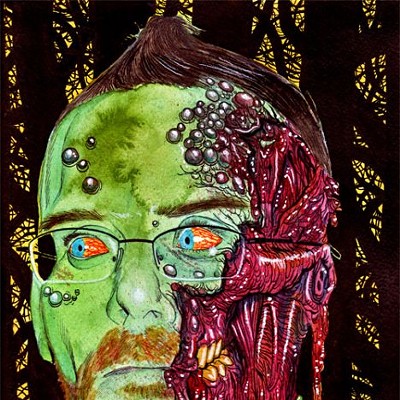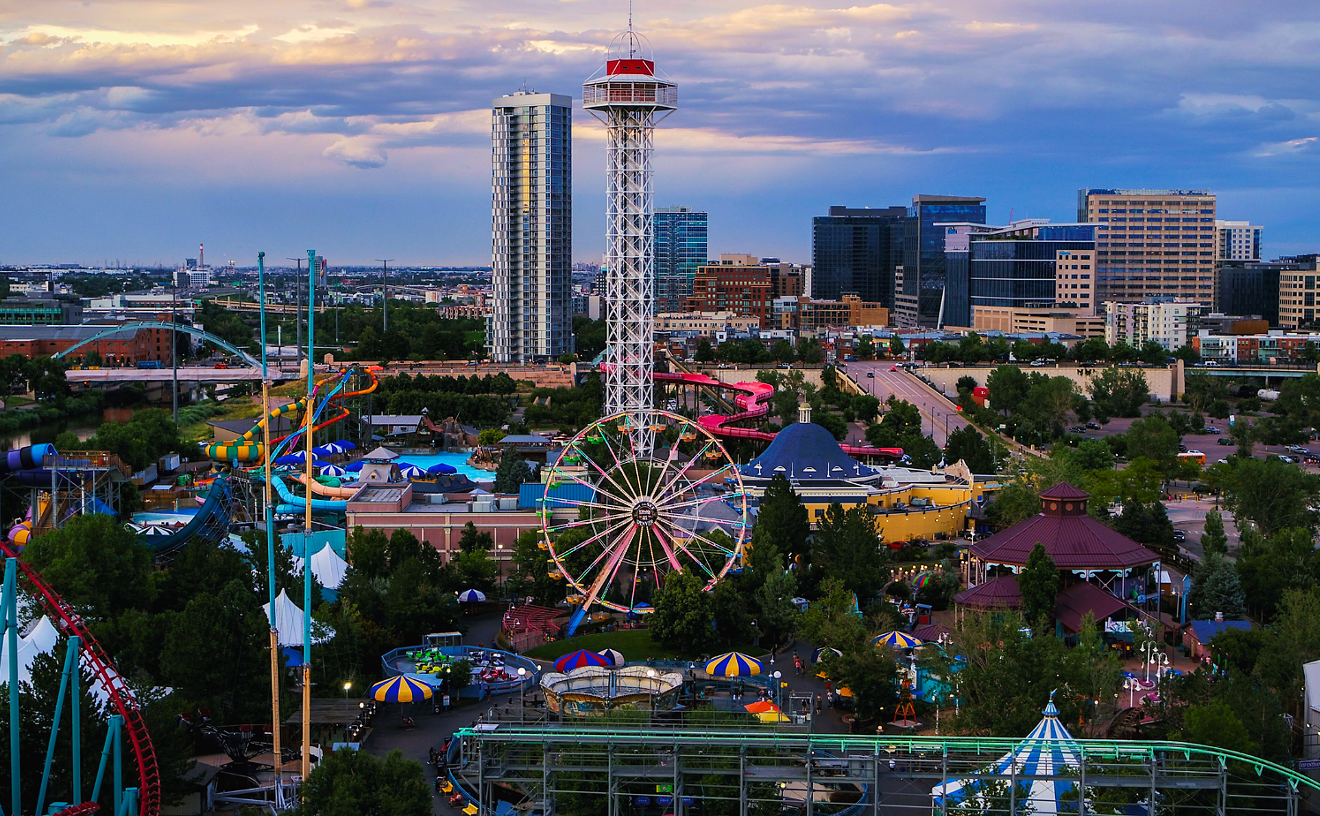See also: 100 Colorado Creatives: Keith Garcia, Denver Film Society
Westword: Can you tell us a little about your background and what you did before you came to the Denver Film Society?
Ernie Quiroz: If you go way, way back, I worked in a Blockbuster Video. I dropped out of college, starting working at Blockbuster Video, and I had always loved movies. Working [there] you just see so many movies. You get five free rentals a week and I probably watched all my five free rentals and borrowed somebody else's rentals for the week, then went to go see what was new in the theaters. I worked there for about five years and just saw so many movies. I think that was sort of my film education.
You watch so many movies and you start to think, "Hey, I could make a movie." So me and my friends started making movies. This was right around the mid to late '90s, when guys like Kevin Smith, Tarantino, all those guys were making movies and it seemed like, "Oh, anybody can do it!" We gave it a shot and [I] ended up at film school in community college in the Phoenix area. Over the course of a couple years, we managed to make some films that got into some festivals -- some features and some shorts. A couple got into Sundance, Tribeca, couple of different festivals. I was mainly the producer.
I spent a couple years on the festival circuit with some projects, then decided I wanted to go back to school and finish my degree. That's when I went to Arizona State University, finished my degree in film and media studies. While I was going to ASU, I ended up volunteering and interning at the Phoenix Film Festival -- the horror and sci-fi festival which they also manage, the Scottsdale International Film Festival -- so I've been with film festivals on both sides, as a participant or volunteer or staff member, since '04 or '05.
My last big job was running the film program at the Phoenix Art Museum. I ran that for about three years. In 2010 they received a grant to redevelop their film program. The film program before I got there, they were showing maybe about twenty to thirty films a year and they wanted to take it up to the next level. I increased the scope of the programming and they ended up doing about 120 films a year. We did first-run films, films that museums had never shown before in the past. We showed certain films just as an art form, equal to anything else the museum would do, like photography and sculpture. I really tried to promote the idea of film as an art form equal to anything else. Then we did some other film series -- more horror films, more documentaries, more challenging films. The members loved it. They really liked it. Attendance went up, revenue went up and I was able to do a lot of really great things at the museum. Now I'm taking the next step and bringing it to the Denver Film Society.
Did you have any connection to the DFS before you were hired?
One of my first goals at the museum, three years ago, they didn't have a model of what the film program should be. I started there as an intern before I was hired full time. One of my jobs as an intern was to research what other people were doing -- other institutions, other museums, other film centers -- and then sort of develop a plan of action based on that. I just started researching other institutions across the country and the Denver Film Society was one of them. They were doing so many great things -- showing local films, holding these mini-festivals, having filmmakers come out. Of course, the Starz Denver Film Festival. They were one of the organizations I looked to to model what I wanted to do at the Phoenix Art Museum. Then I just sort of kept an eye on them over the last couple years, then the opportunity popped up. They needed a new programming manager and I applied and they hired me.
Can you offer some insight into your approach to film programming?
I definitely like to challenge people. It's a balance -- trying to find that balance where I wanted to push the audience, but I didn't want to push them too far where I push them away. If you look back at the archives of what I programmed, that might provide some more insight.
I definitely have a couple of ideas that I've brought to the table. One of the film series I started at the museum -- it's actually going on right now at the museum, you can go online and see what I've programmed -- but one of the series I started three years ago was called CineLatino. The aim of that was to bring brand-new films from Spain, Mexico and Latin America into the museum, films that were on the festival circuit that you couldn't see anywhere else, unless you went to these festivals. I'd bring them to Phoenix to try to tap into what I feel was an underserved market for film in general, but the museum in particular, providing great films from Latin America. There's so many great films from Latin America. I feel it's sort of a hot bed of filmmaking, along with Eastern Europe and the Middle East. There's a lot of great films quickly becoming as viable as anything from Asia or Europe. That's the film series that I want to institute here.
One of the other major film-related events I did was bring in the National Theater Live program to Phoenix. I don't know if you're familiar with how they broadcast the Met to different theaters, but it's very similar. They broadcast these plays from London, from their national theater, to venues all over the world. These are all top-quality plays and a lot of them have a film connection, [like] we had a version of Frankenstein directed by Danny Boyle. Our audience absolutely loved it, and that's another thing I'd like to bring to Denver.
[Another] idea I just had about a week ago ... is the [Starz Denver] Film Festival has about a 35-year history of films that we never tap into. They have this huge archive of films that, once the festival is over, a lot of these films you never hear from again, especially the shorts. I would love to tap into that archive and curate a shorts program from previous years of the festival and bring them back throughout the year. It seems such a shame to have 35 years of history and not to exploit that in a better way.
There's so many films that played at the festival that maybe didn't get distribution, some wonderful, great films that never went anywhere. Let's bring them back. One night only, or a little run, or do a block of shorts, a best-of that we can draw from 35 years of history.
One of the draws of the DFS for a lot of fans is their embrace of genre film -- horror, science fiction, fantasy and the like. Is that something we can expect to continue under your management?
Yes. The Watching Hour was Keith's signature series and it's on hiatus right now. We're discussing what the plans are for that series moving forward, but we all recognize that genre film has an audience. That's one of the tentpoles that the FilmCenter has and that's not going to go away. How that shapes up in the future, I don't exactly know. It's something we're going to take a look at post-festival.
We're trying to make it an event again. The Watching Hour is a big event at the festival and we want to keep that going year-round, and the question is how do we do that. The answer is, we don't know.
Definitely I'm a fan. I'm a sucker for '80s action movies, what some would call crap, but there's some special genius that some have. But yes, there will always be a place for [genre] films at the FilmCenter
Is there anything else you want to say to fans of the Denver Film Society?
One of the things I've said over and over, at the museum and to members here, is that there's no monopoly on great ideas. I just want to throw it out there to pretty much everyone -- If you see a film that you think we should show, whether it's a local film or a film you and your buddies made, let me know. Send me a screener. I can't go to every film festival, I can't watch every movie, so just shoot me an e-mail. I'm open to suggestions. It doesn't mean I'm going to [show] it, but I have no problem sharing credit. I don't try to pretend like I'm some film programming genius. I can't see everything and I need help from everybody. That's what the FilmCenter is all about -- film fans, people who love film and want to share their love of film.
Follow @WestwordCulture











